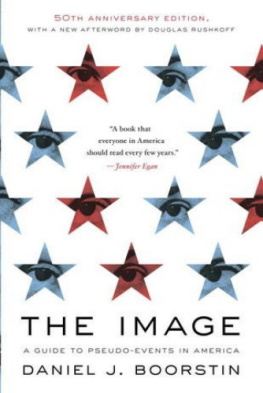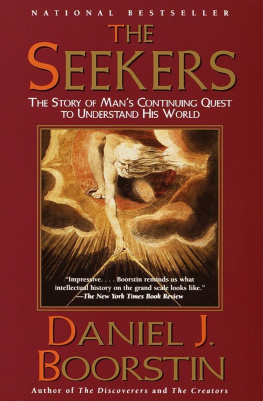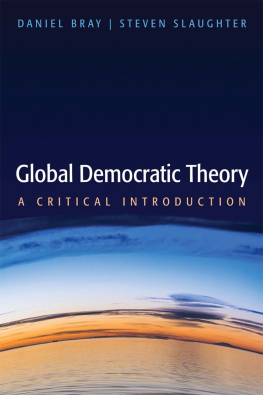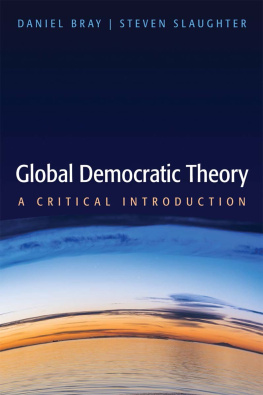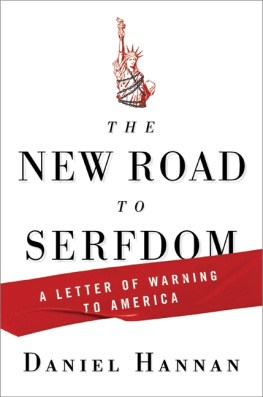Daniel J. Boorstin - The Americans: The Democratic Experience
Here you can read online Daniel J. Boorstin - The Americans: The Democratic Experience full text of the book (entire story) in english for free. Download pdf and epub, get meaning, cover and reviews about this ebook. year: 1974, publisher: Vintage Books, genre: History. Description of the work, (preface) as well as reviews are available. Best literature library LitArk.com created for fans of good reading and offers a wide selection of genres:
Romance novel
Science fiction
Adventure
Detective
Science
History
Home and family
Prose
Art
Politics
Computer
Non-fiction
Religion
Business
Children
Humor
Choose a favorite category and find really read worthwhile books. Enjoy immersion in the world of imagination, feel the emotions of the characters or learn something new for yourself, make an fascinating discovery.

- Book:The Americans: The Democratic Experience
- Author:
- Publisher:Vintage Books
- Genre:
- Year:1974
- Rating:3 / 5
- Favourites:Add to favourites
- Your mark:
- 60
- 1
- 2
- 3
- 4
- 5
The Americans: The Democratic Experience: summary, description and annotation
We offer to read an annotation, description, summary or preface (depends on what the author of the book "The Americans: The Democratic Experience" wrote himself). If you haven't found the necessary information about the book — write in the comments, we will try to find it.
The Americans: The Democratic Experience — read online for free the complete book (whole text) full work
Below is the text of the book, divided by pages. System saving the place of the last page read, allows you to conveniently read the book "The Americans: The Democratic Experience" online for free, without having to search again every time where you left off. Put a bookmark, and you can go to the page where you finished reading at any time.
Font size:
Interval:
Bookmark:
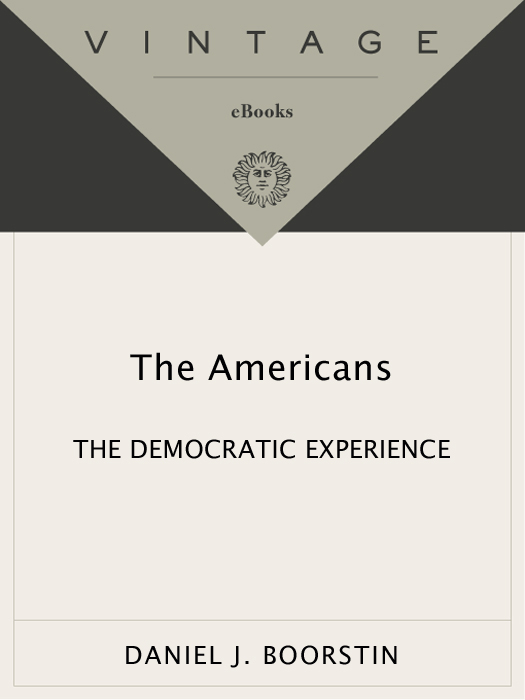
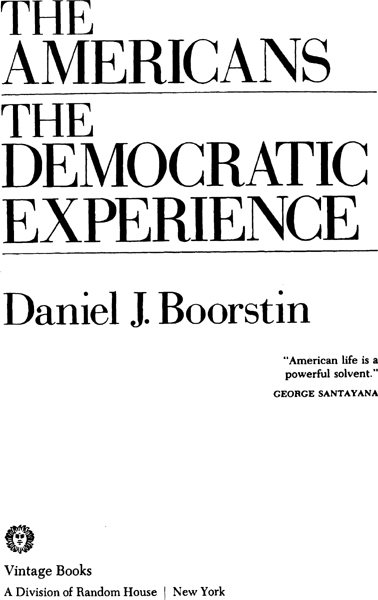
BOOKS BY DANIEL J. BOORSTIN
*
Hidden History
*
The Discoverers
*
Democracy and Its Discontents
* * *
The Americans: The Colonial Experience
The Americans: The National Experience
The Americans: The Democratic Experience
* * *
The Mysterious Science of the Law
The Lost World of Thomas Jefferson
The Genius of American Politics
America and the Image of Europe
The Image: A Guide to Pseudo-Events in America
The Decline of Radicalism
The Sociology of the Absurd
The Chicago History of American Civilization (27 vols.; editor)
American Primer (editor)
American Civilization (editor)
* * *
for young readers
The Landmark History of the American People
Vol. I: From Plymouth to Appomattox
Vol. II: From Appomattox to the Moon
FOR Ruth
In 1868, as the first transcontinental railroad was nearing completion, Charles Francis Adams, Jr., predicted the impending transformation of American experience:
Here is an enormous, an incalculable force let loose suddenly upon mankind; exercising all sorts of influences, social, moral, and political; precipitating upon us novel problems which demand immediate solution; banishing the old, before the new is half matured to replace it; bringing the nations into close contact before yet the antipathies of race have begun to be eradicated; giving us a history full of changing fortunes and rich in dramatic episodes. Yet, with the curious hardness of a material age, we rarely regard this new power otherwise than as a money-getting and time-saving machine. not many of those who fondly believe they control it, ever stop to think of it as the most tremendous and far-reaching engine of social change which has ever either blessed or cursed mankind Perhaps if the existing community would take now and then the trouble to pass in review the changes it has already witnessed it would be less astounded at the revolutions which continually do and continually must flash before it; perhaps also it might with more grace accept the inevitable, and cease from useless attempts at making a wholly new world conform itself to the rules and theories of a bygone civilization.
The century after the Civil War was to be an Age of Revolutionof countless, little-noticed revolutions, which occurred not in the halls of legislatures or on battlefields or on the barricades but in homes and farms and factories and schools and stores, across the landscape and in the airso little noticed because they came so swiftly, because they touched Americans everywhere and every day. Not merely the continent but human experience itself, the very meaning of community, of time and space, of present and future, was being revised again and again; a new democratic world was being invented and was being discovered by Americans wherever they lived.
BOOK ONE
EVERYWHERE COMMUNITIES
P ART O NE
P ART T WO
P ART T HREE
P ART F OUR
BOOK TWO
THE DECLINE OF THE MIRACULOUS
P ART F IVE
P ART S IX
BOOK THREE
A POPULAR MIRACULOUS
P ART S EVEN
P ART E IGHT
BOOK FOUR
THE FUTURE ON SCHEDULE
P ART N INE
P ART T EN
COMMUNITIES
When you get there, there isnt any there there.
GERTRUDE STEIN
AMERICANS reached out to one another. A new civilization found new ways of holding men togetherless and less by creed or belief, by tradition or by place, more and more by common effort and common experience, by the apparatus of daily life, by their ways of thinking about themselves. Americans were now held together less by their hopes than by their wants, by what they made and what they bought, and by how they learned about everything. They were held together by the new names they gave to the things they wanted, to the things they owned, and to themselves. These everywhere communities floated over time and space, they could include anyone without his effort, and sometimes without his knowing. Men were divided not by their regions or their roots, but by objects and notions that might be anywhere and could be everywhere. Americans lived now not merely in a half-explored continent of mountains and rivers and mines, but in a new continent of categories. These were the communities where they were told (and where they believed) that they belonged.
Most of the time we were solitary adventurers in a great land as fresh and new as a spring morning, and we were free and full of the zest of darers.
CHARLES GOODNIGHT
Money-getters are the benefactors of our race.
P. T. BARNUM
To live outside the law you must be honest.
BOB DYLAN
THE YEARS AFTER the Civil War when the continent was only partly explored were the halcyon days of the Go-Getters. They went in search of what others had never imagined was there to get. The Go-Getters made something out of nothing, they brought meat out of the desert, found oil in the rocks, and brought light to millions. They discovered new resources, and where there seemed none to be discovered, they invented new ways of profiting from others who were trying to invent and to discover. Lawyers, who in the Old World had been the staid props of tradition, became a Go-Getting profession, profiting from the hopes of others, from the successes and frustrations of boosters and transients. Federalism itself became a profitable commodity, making business for lawyers and hotelkeepers and bartenders, and building improbable new cities. The moralism of Americans, even their high-minded desire to prohibit vice, itself became a resource, created new enterprises, accumulating fortunes for those who satisfied illicit wants. All over the continenton the desert, under the soil, in the rocks, in the hearts of citiesappeared surprising new opportunities.
1
Gold from the Grass Roots Up
AMERICANS WOULD BECOME the worlds great meat eaters. In the Old World, beef was the diet of lords and men of wealth. For others it was a holiday prize. But American millions would eat like lordsbecause of the efforts of American Go-Getters in the half-charted West.
The Western combination of desert, inedible forage, and unmarketable wild animals offered a puzzling, enticing opportunity to men in search of new wealth. It was seized by Western cattlemen and cowboys. Their great opportunity was to use apparently useless land that belonged to nobody. Theres gold from the grass roots down, declared California Joe, a guide in the gold-rich Dakotas in the 1870s, but theres more gold from the grass roots up. Westerners took some time to discover that gold. But once they discovered it, a rush for the new gold was on. That rush would transform much of the West, would shape the American diet, and created some of the most distinctive American institutions and folk heroesincluding the cowboy.
NOBODY KNOWS EXACTLY how it all began. Legend has it that sometime toward the end of the Civil War a heavy-laden government ox train traveling through the northern plains of eastern Wyoming was caught in a snowstorm and had to be abandoned. The driver returned the next spring to see what had become of his cargo. Instead of the skeletons he had expected to find, he saw his oxen, living, fat, and healthy. How had they survived?
Font size:
Interval:
Bookmark:
Similar books «The Americans: The Democratic Experience»
Look at similar books to The Americans: The Democratic Experience. We have selected literature similar in name and meaning in the hope of providing readers with more options to find new, interesting, not yet read works.
Discussion, reviews of the book The Americans: The Democratic Experience and just readers' own opinions. Leave your comments, write what you think about the work, its meaning or the main characters. Specify what exactly you liked and what you didn't like, and why you think so.

